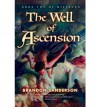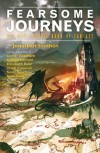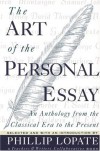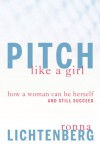Mining the Depths
I'll read almost anything and love what captures my imagination. Best of all is responding to books in the larger cultural sense, loving or loathsome. Literature should have a place in the wider world.
And I'm another GoodReads refugee.
The Orchid Thief: A True Story of Beauty and Obsession
 The Orchid Thief is a little odd, in that it covers so much: tracing not simply Laroche's theft of the wild ghost orchid, but the history of orchid collecting (with a call-back to Paxton who played a significant role in At Home: A Short History of Private Life), the science of orchid growing, the history and place of the Seminole tribe, and Florida's culture and environment.Susan Orlean handles even that many topics with a deft hand, however, and even though the connecting thread of Larcoche's story seemed to be buried in the long sections of history and science, I still found it readable. It did take me only four hours, so your mileage may vary.Orlean has the voice of novelist, so distinct and curious, so it took me a little to realize how quickly we jumped right into the story; no orientation available. Laroche himself seems almost too eccentric to be completely real, and Orlean's repeated descriptions of a hacking, foulmouthed, 'clothing-hanger' thin white guy did little to dispel that impression. The evocation of Florida's swamp and her star orchid enthusiasts were fascinating, and the description of tramping through the swamp goopfully convincing.If I had any complaint about this book, it might be that I found Orlean's repeated questioning of why people would collect orchids—or anything at all—so passionately, a little, I don't know, disingenuous? Obsession has been such a powerful theme since as far back as oral history. She eventually concludes it has to do with making a make-shift community, even family, out of the great wide world while holding on to your individuality and all I could think was duh.There is something of an answer in the back of the book, which includes a readers' guide with author interview and 'Reading Group Questions' (what a state of society, when we have to tell people what to ask!) and reinforces my prejudice against knowing anything about an author other than the words they write in their books. It isn't entirely fair, but for the example of this book, Orleans is asked if she'd ever 'novelize her experiences' (paraphrased)."I never have. People have asked me this, but I think real life is so interesting. I don't think I could have imagined a character as eccentric and fascinating as John Laroche."My response to this is less about Orlean, and more to the culture of our society that insists there's less inherent value and truthfulness in fiction than there is in 'real life'. But how else does perception work? We all tell stories; Orlean admits that this work is about a fascinating character and story.As a devoted reader of fiction, it's simply an attitude that disappoints me. Orlean is a journalist, so she's clearly coming from a different perspective. And it's in part, undoubtedly a failure in the way we teach fiction in school—which has long done little more than drive people away from literature in droves. But I've read about characters far more eccentric than Laroche and the character he's given in the book pegged by the first page. Again, this isn't wrong on Orlean's part. Just, I think, a lack of imagination that maybe points to something rather more problematic in our cultural milieu.I should say none of the above general criticism of society affected my star rating. Three stars just means "I liked it" and that's all. I wasn't particularly blown away, and while I enjoyed the prose I don't feel I need to read it again. I just...liked it.P.S. Apparently there was difficulty finding an orchid for the cover that wasn't 'too sexual'. How...Victorian. Orchids have never particularly affected me that me that way, but does the general reading public have that much difficulty controlling themselves? I mean, I'm sure they can see the illusion without losing it in the bookstore stacks.
The Orchid Thief is a little odd, in that it covers so much: tracing not simply Laroche's theft of the wild ghost orchid, but the history of orchid collecting (with a call-back to Paxton who played a significant role in At Home: A Short History of Private Life), the science of orchid growing, the history and place of the Seminole tribe, and Florida's culture and environment.Susan Orlean handles even that many topics with a deft hand, however, and even though the connecting thread of Larcoche's story seemed to be buried in the long sections of history and science, I still found it readable. It did take me only four hours, so your mileage may vary.Orlean has the voice of novelist, so distinct and curious, so it took me a little to realize how quickly we jumped right into the story; no orientation available. Laroche himself seems almost too eccentric to be completely real, and Orlean's repeated descriptions of a hacking, foulmouthed, 'clothing-hanger' thin white guy did little to dispel that impression. The evocation of Florida's swamp and her star orchid enthusiasts were fascinating, and the description of tramping through the swamp goopfully convincing.If I had any complaint about this book, it might be that I found Orlean's repeated questioning of why people would collect orchids—or anything at all—so passionately, a little, I don't know, disingenuous? Obsession has been such a powerful theme since as far back as oral history. She eventually concludes it has to do with making a make-shift community, even family, out of the great wide world while holding on to your individuality and all I could think was duh.There is something of an answer in the back of the book, which includes a readers' guide with author interview and 'Reading Group Questions' (what a state of society, when we have to tell people what to ask!) and reinforces my prejudice against knowing anything about an author other than the words they write in their books. It isn't entirely fair, but for the example of this book, Orleans is asked if she'd ever 'novelize her experiences' (paraphrased)."I never have. People have asked me this, but I think real life is so interesting. I don't think I could have imagined a character as eccentric and fascinating as John Laroche."My response to this is less about Orlean, and more to the culture of our society that insists there's less inherent value and truthfulness in fiction than there is in 'real life'. But how else does perception work? We all tell stories; Orlean admits that this work is about a fascinating character and story.As a devoted reader of fiction, it's simply an attitude that disappoints me. Orlean is a journalist, so she's clearly coming from a different perspective. And it's in part, undoubtedly a failure in the way we teach fiction in school—which has long done little more than drive people away from literature in droves. But I've read about characters far more eccentric than Laroche and the character he's given in the book pegged by the first page. Again, this isn't wrong on Orlean's part. Just, I think, a lack of imagination that maybe points to something rather more problematic in our cultural milieu.I should say none of the above general criticism of society affected my star rating. Three stars just means "I liked it" and that's all. I wasn't particularly blown away, and while I enjoyed the prose I don't feel I need to read it again. I just...liked it.P.S. Apparently there was difficulty finding an orchid for the cover that wasn't 'too sexual'. How...Victorian. Orchids have never particularly affected me that me that way, but does the general reading public have that much difficulty controlling themselves? I mean, I'm sure they can see the illusion without losing it in the bookstore stacks.
Currently reading
The Well of Ascension
Progress:
325/781 pages
Steelheart
Progress:
26 %
Fearsome Journeys: The New Solaris Book of Fantasy
Progress:
57/395 pages
Dracula
The Guermantes Way
The Art of the Personal Essay: An Anthology from the Classical Era to the Present
Mad Ship
Pitch Like A Girl: How A Woman Can Be Herself And Still Succeed
A History of Pi
English Creek












